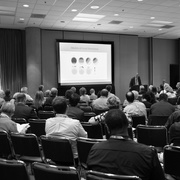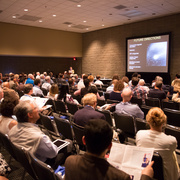
Choose a channel
Check out the different Progress in Mind content channels.

Progress in Mind




Imagine if one working week every month your work performance was limited or compromised. That’s the situation faced by many schizophrenia caregivers who also hold down paid jobs, according to the findings of a large-scale caregiver survey presented by Dr Debra Lerner of the Tufts Medical Center, Boston, at the 2016 APA congress.
Dr Lerner said that over 18% of adults in the US act as unpaid caregivers, and she cited the findings from On Pins and Needles study which showed that three quarters of caregivers looking after someone with mental health issues find the task emotionally stressful.
Many caregivers to people with schizophrenia and schizoaffective disorder work, and Dr Lerner therefore said it was important to try to understand the impact that their caregiving had on work function and productivity. To this end, Dr Lerner got involved in conducting a survey of caregivers who also worked, asking about their paid work commitments and employment.
She described the anonymous on-line survey, which included a number of validated tools such as the work limitations questionnaire (WLQ), designed to assess time lost from work (absenteeism), presenteeism and impact of caregiving on work productivity.
Results from over 1000 caregiver questionnaires were available for analysis, and showed that the average age of caregivers was 55 years, with the average age of the care-recipient 40 years. Most caregivers were women and most were the parent of the person with schizophrenia or schizoaffective disorder.
Over 60% of caregiver respondents were in current work and of those, 69% reported being in full time work. Dr Lerner said that these statistics showing high rates of full time work among carers, emphasized the need to make things easier for caregivers, particularly as the survey showed that most worked outside of the home and many had lengthy commutes to their place of work.
Over a quarter of caregivers in work said they often had to take time off work but more than half said it was difficult to take time away from work for personal matters. Missing an average of 0.6 days per week from work and associated with work productivity losses of around 8%, Dr Lerner said that caregivers had work losses that are equivalent to those experienced by patients with MDD.
The survey highlights that being a caregiver to a person with schizophrenia spills over into work – with a negative impact on productivity. More research is needed to understand and quantify the burdens on those who care for people with serious mental illness.
Hot on the heels of a study showing that at least 8.4 million Americans provide care to an adult with an emotional or mental health issue, comes further information highlighting caregiver burden.







SD, unlike loneliness, is an objective term to describe social isolation, Junghee Lee, UCLA, Los Angeles, USA, explained. It is prevalent in schizophrenia and is important because it affects survival direly – and to a greater extent than smoking. Unlike loneliness, you can die from SD.
Both social cognition and affiliation are affected in psychosis. This makes its study difficult. After all, how to you recruit socially-reclusive people to a clinical study?
By advertising, it would appear! Two small adverts were posted requesting people with few friends and no real inclination to make friends to respond. And respond they did – 66 calls over 3 days. By a sifting process, the general population was enriched for 28 individuals who were engaged in the community (i.e. they worked) but were socially isolated.
Unlike patients with schizophrenia, however, such individuals showed no evidence of social cognition deficits. They did show low levels of social affiliation. It seems, in the community, there are people who naturally avoid social situations. Intriguingly, their curiosity as to why this might be was what induced them to answer the ads.
Melissa Selb, of the WHO ICF Research Branch, Germany,, explained how, as part of its drive for health for all, the WHO has changed tack. Now instead of compiling only mortality and morbidity (ICD) statistics, it is collating the associated functioning and disability (ICF) that accompanies a condition.
Functioning and disability refer to a person’s:
Participation – e.g supported work programme
Activities e.g ability to wash oneself
Body function e.g thought function
Body structure e.g brain function
Environmental interactions e.g medication, family
Aspects of each of these were taken into consideration when creating the ICD-11 report with specific reference to schizophrenia. In total, 1400 ICF categories were described. As these are cumbersome to use, ICF core sets and brief core sets have been developed, making the classification system more user-friendly.
The ICF core sets were developed in 3 phases: a preparatory phase, phase I and phase II. Currently, the guidelines are in Phase II of development but the other phases were outlined.
Georgina Guilera, University of Barcelona, Spain, described the initial preparatory phase of the WHO project. Here the functional and environmental factors associated with schizophrenia were considered from 4 perspectives – clinical, research, patient and health care professional.
To address the clinical perspective, an empiric, multicentre study was conducted. Five Spanish centres contributed to this study and data were collected by health care professionals using the extended WHO checklist. Their responses were extracted and translated into ICF categories. ICF categories described functional impairment in body function (32), activities and participation (45) and environment (18).
A systematic literature review was undertaken to address the research perspective. A total of 206 studies identified ICF categories. These described functional impairment in body function (30), body structure (2) activities and participation (34) and environment (4).
The mortality associated with social disconnectedness in schizophrenia is greater than for smoking
For the patients’ perspective, a qualitative study was undertaken comprising 11 focus groups (7 for patients and 4 for caregivers) in Spain and US. The outcomes yielded ICF categories for body function (45), body structure (6) activities and participation (60) and environment (38).
Overall, the preparatory phase identified 184 candidate categories – clearly far too many for daily use. Oscar Pino, University of Barcelona, described how these were whittled down to generate comprehensive ICF core sets and brief core sets.
International experts in schizophrenia from a variety of fields were invited to consider the candidate categories and to achieve consensus on the minimum that should be included. This minimum number should describe exhaustively the key functional disabilities of those with schizophrenia. If consensus was less than 40%, categories were excluded; if consensus was greater than 75%, they were kept. Those falling between these values were discussed in a second session to attain consensus.
Eventually, a comprehensive ICF core set was achieved containing 97 ICF categories: body function (17), body structure (0) activities and participation (48) and environment (32). Following further discussion and some serious ranking, a brief core set of 25 ICF categories was agreed.
Now that all this work has been completed, validation of the categories generated in phase I is being undertaken. Outcomes are awaited with interest.
Poor functioning is an acknowledged hallmark of schizophrenia.
